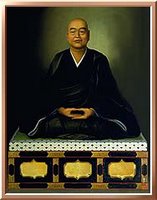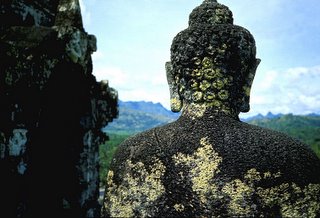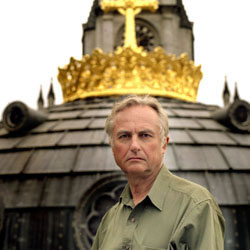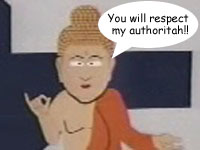Dogen's Genjo Koan (Pt.1)
 Dogen's Shobogenzo is a notoriously difficult Zen text. I want to post an interpretation of the Genjo Koan - one of the most frequently quoted texts - here, as a tool for my own understanding, which might hopefully be of use to others too. I have no knowledge of Japanese nor am I a scholar of Dogen. These comments are purely those of an interested amateur and primarily for the purpose of ongoing personal study. Posting a public essay forces me to be more rigorous than I otherwise would and will hopefully put me in good stead for interpreting the rest of the Shobogenzo and Buddhist texts in general. Comments are welcome of course.
Dogen's Shobogenzo is a notoriously difficult Zen text. I want to post an interpretation of the Genjo Koan - one of the most frequently quoted texts - here, as a tool for my own understanding, which might hopefully be of use to others too. I have no knowledge of Japanese nor am I a scholar of Dogen. These comments are purely those of an interested amateur and primarily for the purpose of ongoing personal study. Posting a public essay forces me to be more rigorous than I otherwise would and will hopefully put me in good stead for interpreting the rest of the Shobogenzo and Buddhist texts in general. Comments are welcome of course.
I will look at Gudo Nishijima's interpretation based on his own translation Understanding the Shobogenzo and Thomas Cleary's interpretation based on his own translation. I will use the translation by Aitken and Tanahashi.
As far as I understand at this time, it would seem that the key to the Genjo Koan is a Buddhist concept that might be termed 'The Non-duality of Relative and Absolute'. This is concept is the subject of the 'Sandokai' poem quoted in my recent blog. It's also essential to understanding the meaning of the Ox-Herding Pictures and these lines from the Heart Sutra:
Shariputra, form does not differ from emptiness; emptiness does not differ from form. Form itself is emptiness; emptiness itself is form. So too are feeling, cognition, formation, and consciousness.
Similarly it is the core meaning of Dogen's concept of 'the onenness of practice and attainment' and is the key to understanding a number of otherwise obscure Koans and other teachings. One example is the apparent contradiction between the Buddhist emphasis on compassionate behaviour and of following precepts and the teaching that there is 'no good and evil'. One is the relative, conventional truth and the other is the absolute truth.
The everyday world of multiplicity - of thoughts and objects and persons and morals - is the world of conventional or relative truth. The ultimate truth is that none of these things has an inherent nature or existence - the ultimate truth is 'emptiness' and 'oneness'. Yet, while many who realise emptiness may believe themselves enlightened, this is not regarded as complete enlightenment - they are 'clinging to emptiness'. The reason for this is that by realising 'oneness' or 'nirvana' they depend upon a dualistic distinction between oneness and multiplicity or between nirvana and samsara. The final step is to return to the world of multiplicity and samsara and realise non-duality - including the nonduality of relative and absolute.
No trace of enlightenment remains, and this no-trace continues endlessly.
Dogen
Thomas Cleary's approach to the Genjo Koan is well summed up here:
The very first paragraph contains a complete outline of Zen, in a covert presentation of the so-called "five ranks" (go i) device of the original Chinese Soto Zen school. The scheme of the five ranks-relative within absolute, absolute within relative, coming from within the absolute, arriving in the relative, and simultaneous attainment in both relative and absolute-is not overtly used in Dogen's work, perhaps because of the confusion surrounding it, but its structures are to be found throughout Shobogenzo.
Cleary sees the koan in terms of complex interrelationships between relative and absolute, culminating in a simultaneous non-dual realisation of both relative and absolute.
Thirty years ago, before I began the study of Zen, I said, 'Mountains are mountains, waters are waters.' After I got insight into the truth of Zen through the instructions of a good master, I said, 'Mountains are not mountains, waters are not waters.' But now, having attained the abode of final rest, (that is, Enlightenment) I say, 'Mountains are really mountains, waters are really waters.'
Ch'ing yuan Wei-hsin
Nishijima interprets the Shobogenzo in terms his hypothesis of 'Four Views' or 'Three Philosophies and One Reality', in a scheme abbreviated as S.O.A.R - Subjective, Objective, Action, Reality. According to Nishijima, the Subjective view corresponds to the western philosophy of Idealism; the objective view corresponds with Materialism; Action corresponds with existential-type philosophies and Reality is not a philosophy but refers to reality itself.
After studying the Shobogenzo for more than 50 years, my confidence is complete: the aim of Buddhism is to realize reality. Gautama Buddha urged us to find reality by practicing Zazen...Can we, then, have a philosophy of reality, if reality is outside the area which philosophy deals with? Logically we must say the answer is no. Reality and intelligence are completely separate. What kind of system can we construct which will allow us to pursue a description of reality?
It was in just this state that Buddhists developed their unique method of explaining reality. The method is called catvary arya satyani, or the four noble truths, and it explains the relationship between intellectual activities and reality using four viewpoints. The first two viewpoints are the traditional philosophical standpoints, the third is a philosophy of reality and the fourth is experiential reality.
This is the hypothesis that I developed forty years ago from studying the Shobogenzo, and although it did not have the backing even of Buddhist society in Japan I can find no no inadequacies in my idea, no matter how hard I try.
While there is certainly a consensus that Buddhism is about finding reality, this is a statement that needs clarification. There are parallels between Nishijima's interpretation and that of Cleary and other scholars, for example, intellect - the philosophies of Subjectivism and Objectivism might be seen as duality or relative truth, while reality itself and perhaps the method of action that is used to find it might be seen as absolute truth. However, I see no analysis of any simultaneous realisation of these two and there is much in Nishijima's analysis that seems idiosynchratic - his emphasis on intellectual duality as opposed to duality generally and on philosophical Materialism and Idealism.
He openly admits that his hypothesis 'did not have the backing even of Buddhist society in Japan' whereas Cleary, although the scheme he describes 'is not overtly used' in the Shobogenzo is able to cite a precedent for the scheme he claims Dogen is using - 'the so-called "five ranks" (go i) device of the original Chinese Soto Zen school'.
I will follow with detailed interpretations by both Cleary and Nishijima, and finish with my own reading.





























